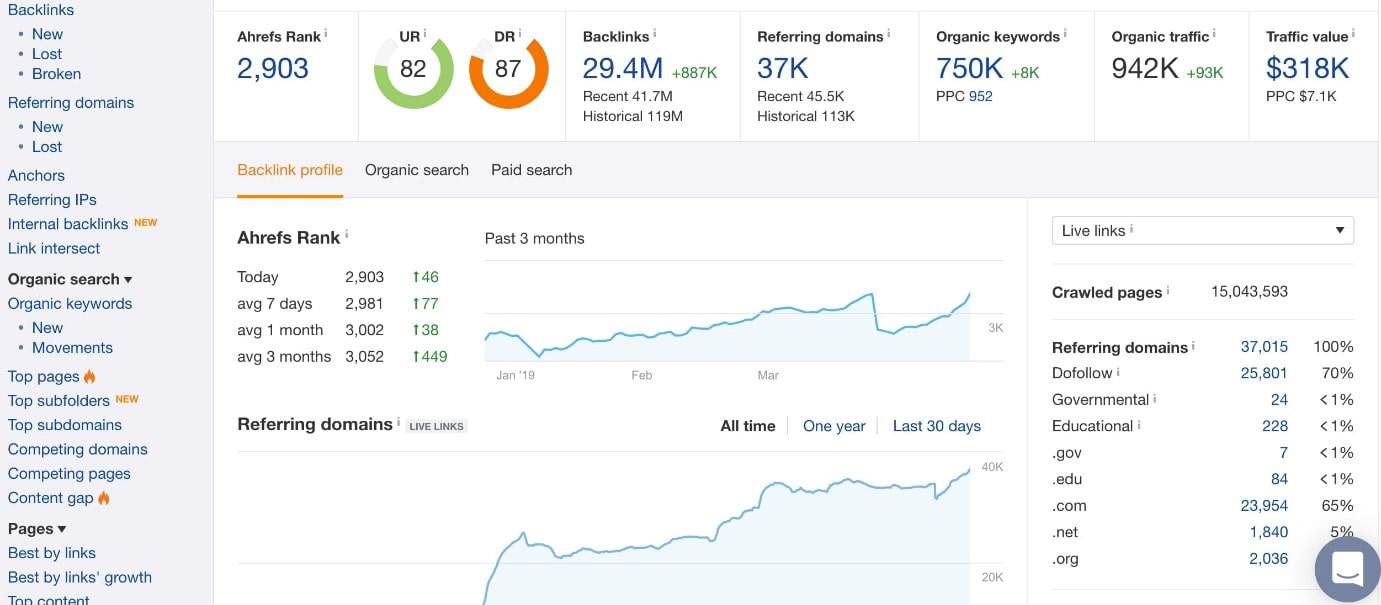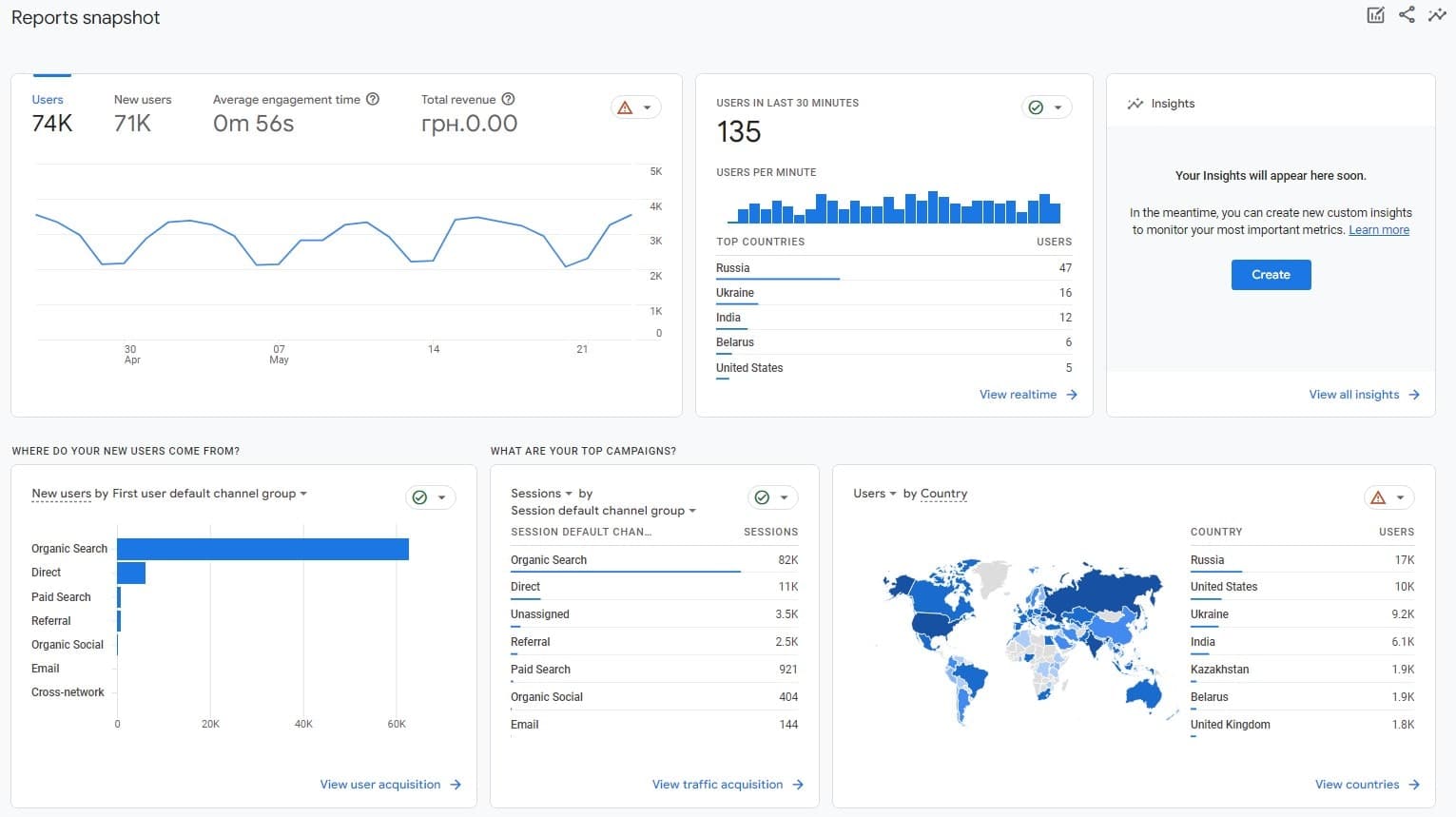Welcome into the digital era, one of invention, creativity, and virtual interaction. One often used phrase in this scene is “Digital Marketing Strategy.” What then is it exactly, and why should it matter?
Consider a digital marketing plan as your lighthouse for online presence, directing your brand across the vast internet. It lists your goals, charts your efforts, and specifies your success criteria. It’s the strategy that will enable you to meaningfully engage with your target audience and cut through the noise.
Our exploration of a digital marketing plan will cover these areas:
- Setting objectives and spotting a target audience
- Choosing appropriate outlets and channels
- Designing interesting material
- Monitoring and evaluating development using Plerdy’s tools
Applied well, a digital marketing plan is a powerful instrument transforming simple online life into a dynamic, interactive experience. It’s time we explore this amazing planet more thoroughly and discover the keys to rule the digital marketing game. So grab on and get ready for the trip!
Understanding Digital Marketing

Knowing digital marketing calls much more than just appreciating its buzzword character. Understanding its systems can help you to shape, guide, and influence consumer decisions in an environment going more and more digital. It is a complex tapestry combining strategic strategy, creativity, and technology.
To give this concrete form, consider this:
- Owner of a boutique coffee business here seeks increased foot traffic. Using strong analytics tools, you create a great social media campaign. You match posts to localised trends, best keywords, and times of maximum user interaction.
- On the other hand, consider yourself a budding writer trying to boost book sales. Using segmentation and email marketing, you send each of your customers customized communications. Tracking user interactions helps you to improve your approach for higher conversion rates.
- Alternatively you could be a non-profit seeking increased contributions. You employ sponsored search ads and bidding on key terms to improve the profile of your cause.
Every one of these situations captures the core of digital marketing. It’s about developing a vibrant plan that interacts with customers where they spend their time—online. You drive decisions, maximize for success, and change as you go by means of data analysis. By means of this, digital marketing can become a pivot point providing major leverage to increase the awareness of your brand, audience interaction, and general corporate development.
The Importance of a Digital Marketing Strategy

Online performance of your brand depends on a strong digital marketing plan. It’s the road map helping you to go to your intended location without straying from path.
Using examples from other niches, let’s make this come alive:
- Imagine a software startup publishing a ground-breaking app. They would require a strict content marketing strategy, creating interesting blog entries, and include interesting social media material. This fosters brand recognition, app downloads, and a vibrant online community.
- Think about a fashion brand starting a fresh line. By means of a focused paid advertising approach, they directly position their items in front of the optimal customer base, therefore increasing brand reputation and exploding sales.
- Consider a reputable law practice trying to grow its clientele. Applying search engine optimization strategies helps them to rank highest among search engine results, so generating natural, high-intention visitors to their website.
The relevance of a digital marketing plan transcends simple strategies. It calls for a thorough awareness of your target audience—what they desire, how they see, and where they interact online. This approach motivates your behavior and helps you to get to them successfully.
Furthermore, a good plan helps you to evaluate outcomes, grasp your return on investment, and always improve your method of approach. In this context, a digital marketing plan is not an optional bonus; rather, it is a necessary element of the terrain of modern company. Accept it and see how your brand’s internet profile changes.
Components of a Digital Marketing Strategy
The components of a digital marketing plan are what give it power—well-oiled gears cooperating to drive your online presence. Consider these basic components to help you understand this complex machinery:
- Starting with reasonable, unambiguous goals, Whereas a health blog would concentrate on tripling its monthly page views, an e-commerce company might want to increase conversions by 15% in the next quarter.
- Audience Identification: Know to whom you are addressing. An organic skincare brand appeals to environmentally aware clients that also value wellness. Simultaneously, a B2B software startup targets medium-sized to large company IT decision-makers.
- Plan your communications using a content strategy. On a blog, a fitness trainer might include nutritional advice and exercise regimens. Concurrent with this is a tax adviser providing free webinars on tax-saving techniques.
- Channel of Choice: Choose where your audience will be engaged. Instagram’s visual narrative is something an indie music band might rely on. Simultaneously, a tech news site discovers a vibrant Twitter following.
- Measure your outcomes and make appropriate adjustments in analytics and modification. Analyzing client campaign data would help a digital marketing agency identify areas needing work. Concurrently, a travel vlogger monitors audience participation to maximize video content.
Every element locks together to create a strong digital marketing plan, your lighthouse in the ever changing web terrain. Your brand lives, connects, and demands attention in the busy digital market by deftly combining these components—not only exists online.
Steps to Develop a Digital Marketing Strategy

Creating a dynamic digital marketing plan is like building a strong bridge; great preparation creates a solid road towards success. This is how you build that bridge:
- Tell us exactly what you want to achieve. In six months, a vegan food blog would hope to boost membership by thirty percent.
- Describe Your Audience: Know the person you want to contact. An adventure tourism business is geared toward outdoor lovers and thrill-seekers.
- Evaluate your present digital presence. Check your position. A digital startup might evaluate its website traffic, email campaign performance, and social media interaction to find areas for improvement.
- Create your content strategy: Organize the material you will present to your readers. Reports on weekly market analysis could be sent to clients by a financial advisor.
- Choose channels of distribution for: Choose where you will interact with your readers. For highlighting their visual appeal, a premium fashion firm can find Pinterest and Instagram fit.
- Create an analytical and measuring system. Choose your criteria for success. Key performance metrics for a digital publisher might be bounce rate, time on site, and click-through rate.
Every action opens the path to a thorough digital marketing plan catered to your brand’s specific needs and ready to negotiate the tides of the online market. This trip is more than just about building a resonant digital identity and a web presence. Equipped with a well-crafted plan, your brand may boldly explore the digital frontier and have long-lasting effect.
Digital Marketing Strategy Best Practices
In the fast-paced digital marketing space, success depends mostly on a strong strategy. Developing a digital marketing plan that distinguishes you calls for a combination of analytical thinking, imagination, and a strong awareness of your target market. Here are some tried-and-true recommended practices to forward your digital marketing plan.
- First, welcome data’s ability to empower you. Use statistics to guide your plan; know the tastes of your audience, how well your campaigns perform, and the subtleties of your industry. This knowledge will help you maximize your efforts and guarantee that every action is based on facts.
- Second, pay attention to personalization. Personalized message can be a lighthouse of relevance in a digital terrain when customers are overflowing with content. Tailor your messaging to fit the particular requirements of your audience; the more customized, the better.
- Thirdly, give mobile first priority. Since most consumers access material on mobile devices, maximizing for mobile is not only a need but also a must. To appeal to this important target segment, make sure your website, materials, and adverts are mobile compatible.
Here are also some additional ideas to give thought:
- Make great, worthwhile content investments. Still true, the saying “Content is king” is not any one thing. It should be interesting, educational, and fit for the demands of your readership.
- Use social media channels. Utilize social media to include your readers and foster community.
- Maintaining current with the newest trends is Digital marketing is a dynamic field; following trends can help you to stand out from rivals.
Finally, constantly value the ability of testing and optimization. Constant change and improvement helps even the most carefully thought out plans. Review your campaigns often; use the data to learn; then, hone your plan.
Following these best practices will help your digital marketing plan to be a very effective tool, shining your brand and transforming prospects into devoted consumers.
Case Studies of Successful Digital Marketing Strategies

In the busy field of digital marketing, strategic planning is the bedrock of success most solid. Case studies abound on the internet showing how effectively well-written plans can drive companies to new heights. Let’s go closely into a handful of these motivating stories.
First on top is Airbnb’s “Live There” campaign, which highlighted its original selling point—an opportunity to see local areas. They made use of user-generated material so that visitors may spread their unique experiences. The crowd connected with this approach, which resulted in a substantial booking increase.
In line with this, we also have Domino’s creative approach. With the “AnyWare” campaign, they reinterpreted the pizza-ordering procedure letting consumers order by text or twitter. Accepting the digital change, they simplified the consumer experience and hence saw an amazing increase in sales.
Let’s acknowledge the community-building project of American Express. They created the small company resource center known as the “Open Forum” website. Through providing worthwhile material, they built confidence and strengthened their brand reputation.
Important lessons from these effective tactics consist in:
- Approach from customer-centric: Know your audience and customize your plan to fit their requirements.
- Making use of user-generated content will help clients to become brand champions.
- Accept innovation and dare to include the newest digital trends into your approach.
- Value proposition: Provide something distinctive that distinguishes your brand from others.
- Creating Communities: Develop ties with your clients outside of business dealings.
These case studies highlight the effectiveness of a carefully thought out digital marketing plan. These companies have found their place in the digital realm by knowing their audience, using user-generated content, and welcoming innovation. For those traveling to digital marketing success, the insights from their success stories can act as a road map.
Digital Marketing For Small Business
A necessary link between small companies and their consumers in the large online market is digital marketing. The cornerstone turns a modest business into a profitable one without running afoul of budget.
Think through the several possibilities:
- Local SEO techniques help a neighborhood bakery to show high on local search results. This increases foot traffic, therefore enhancing sales and strengthening ties in the community.
- Showing exquisitely lit candles and telling the narrative behind each distinctive aroma, a home-based candle producer captures potential consumers on Instagram. This creates a devoted clientele fit for the values of the brand.
- A tiny fitness studio provides customised online training courses backed by a well-optimised website and consistent email newsletters loaded with health advice. This increases their income sources and helps them to be beyond national borders.
- Reviewing the newest publications and offering author interviews, a family-owned bookstore maintains a blog. By use of social media, they magnify this material, therefore fostering involvement and online purchases.
Adopting a digital marketing plan calls for innovation, a sharp awareness of the target demographic, and a strategic approach rather than a massive budget or a big staff. Leveraging their special qualities to connect, interact, and convert, small businesses may compete on an even playing field in the digital environment. It’s about shining your business more brilliantly in the digital constellation, not only about bringing it online.
How to Create a Digital Marketing Strategy

Developing a strong digital marketing plan can feel like piecing together a puzzle—each element put precisely results in an interesting overall picture. Using these guidelines, assemble your digital masterpiece:
- Clearly state your goals. Start by listing your goals. A new clothing company would, for example, want to raise brand awareness in its first year.
- Recognise Your Audience: List the people you must contact. A gourmet coffee establishment, for instance, appeals to those who value unusual blends.
- Review your present digital standing. Check your online presence. A regional law practice might evaluate online client interaction and website search engine performance to pinpoint areas needing work.
- Decide on your content strategy. Plan your material. A parenting blog could highlight sharing relevant experiences and offering doable advice for new parents.
- Select the appropriate channels: To network with experts and potential customers, a start-up IT company could rely mostly on LinkedIn and industry-specific forums.
- Measuring and adjusting: Create a system to monitor outcomes and change your plan. Key indicators for a boutique hotel might be guest reviews, internet bookings, and social media contacts.
Every phase of this approach adds to a comprehensive digital marketing plan, your road map over the always changing digital terrain. The outcome is a presence online and a dynamic digital character that appeals to your target market, improves brand recognition, and drives company expansion. With a well-crafted plan, you will elegantly and with confidence negotiate the digital highway.
The Future of Digital Marketing Strategies
The future of fast changing digital marketing is one of fluid, creative, forward-looking ideas. New technologies continuously redefining customer involvement, hence marketers have to keep their fingers on the digital revolution to make sure their tactics match changing consumer expectations and trends.
The first priority in marketing will always be personalizing. Take Stitch Fix, which uses artificial intelligence and machine learning to provide a tailored shopping experience. Using consumer data, they create customized style boxes and forecast preferences, so involving consumers with things they enjoy.
The value of social media in digital marketing will only grow more evident. Instagram’s shopping tool lets companies like Gymshark show items straight in posts, therefore simplifying the purchase experience and raising conversion rates.
One such area becoming popular is voice search. Imagine a home décor company maximizing their material for voice search so that consumers may more quickly find items by simply asking their smart speaker.
User experience will keep being redefined by virtual and augmented reality (VR/AR). Already using AR, companies like IKEA let consumers see furniture in their homes before making a purchase.
Digital marketing plans in future years could resemble this:
- Вesigning a customized client path grounded in gathered data.
- Increasing presence on several social media channels and include shoppable postings.
- Improving content and website for voice search.
- Using VR/AR experiences to improve client contact.
Managing the future of digital marketing calls for a flexible approach that welcomes new technology, recognizes shifting consumer behavior, and always changes with respect. This is an interesting trip into the future that offers more contacts, interesting events, and unmatched chances for personal development.
How to Track Progress Digital Marketing Strategies?

Often unlocking the full potential of a digital marketing plan depends on thorough tracking. Having a toolkit helps one to evaluate success more quickly. Let us use a strong SEO tool as an example: Plerdy.
Plerdy lets companies examine every component of their digital plan. It provides real-time analysis of user activity, including how users explore your website, which areas pique their interest, where they click—the list continues. The basis of data-driven decision-making, these heatmaps provide detailed insights.
One e-commerce store might use Plerdy to maximize product pages. They can maximize other pages based on the product images or descriptions visitors interact most with.
Plerdy mostly enables tracking of development in several ways:
- Heatmaps show user behavior and point up areas that call for work.
- Event tracking lets Plerdy track clicks and conversions on particular page components.
- SEO-checker. This tool, which monitors the SEO condition of your website, guarantees that you never miss a beat in natural results.
Tracking progress with Plerdy is like sailing over the tumultuous seas of digital marketing with a compass. It directs the improvement of strategy, highlights prospects, and helps to prevent possible mistakes. Using a platform like Plerdy helps businesses to make sure their digital marketing plan is headed in the correct direction, so improving their online presence and optimizing return on investment.
Last Thought
Developing a digital marketing plan can feel like an epic trip. Let’s solidify our knowledge as we negotiate this journey.
Digital marketing plan is a lighthouse showing your company’s road forward. It guides your brand across the huge online sea, allowing it to flow effortlessly. Although decoding this complicated road map is not always simple, it is a journey worth starting.
Your company engine runs on your strategy in the race of the digital world. It is the master strategy that guides your online presence, charts the path to your target audience, and specifies the tasks to do. And hence the outcome? a buying path with significance beyond mere efficiency.
Remember as we ground our ship at the end of the voyage:
- Your digital marketing plan is your online survival guide, not only a buzzword.
- Maintaining relevance online depends on your actions complementing your digital marketing plan.
- Tracking and enhancing your digital path depends much on tools like Plerdy.
Ultimately, using a disciplined digital marketing plan will turn your online activities from simple presence into active participation. And keep in mind that, although it is a science, it is an art; hence, allow the artistic flow in your path of digital marketing. Seeking a travel partner on this journey? For a simplified experience, try Plerdy now!
